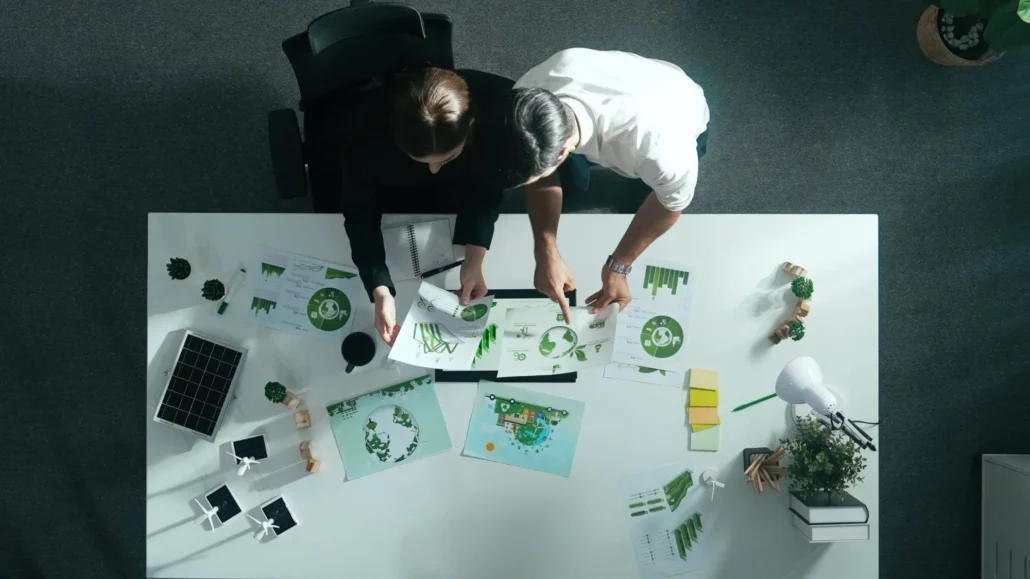Businesses that avoid measures to manage and reduce their own climate impact tend to argue that their microscopic contribution will do nothing for the planet in the first place, so why commit time and money to something so intangible and yet time consuming? This reasonable business decision is under threat from improving scientific and medical evidence suggesting that such environmental myopia is storing up disturbing indirect and unintended consequences for the mental health and productivity of the workforce. As the evidence grows, so will the suggestion that doing nothing is negligence.
Not on my horizon
The majority of businesses in developed economies are dislocated from the direct and physical effects of global warming. The CEO of a mid-sized widget-maker in Birmingham (UK) does not look out of his boardroom window to see his house and life possessions being engulfed by a mud slide caused by catastrophic flooding. This goes some way to explaining why over 80% of corporate respondents to the TDH survey of over 120 businesses employing between 10 and 50 people either have no plans to reduce emissions, or are just thinking about a plan (1):
TDH Corporate ESG Survey question:

Source: TDH Corporate ESG 3.0 Assessment Qu 34 ‘Do you have a program to reduce your carbon emissions?
The Science is shrinking your horizon
Science is rapidly working through the direct and indirect, physical and mental effects of climate change. At the core, advances in climate science have already established powerful links between global warming and extreme weather events. Subsequently medical science has built a strong body of evidence linking climate change with deteriorating biological health in exposed communities, for example from: water, air and vector-borne disease, respiratory illness, heat-related illness and malnutrition(2).
More recently, medical science has identified the psychological impact that climate change is having on the mental health of those directly exposed to its effects including anxiety, stress, relationship/family breakdown, PTSD and increased rates of suicide (3).
A very modern problem:
Today, medical and climate science is probing the psychological distress caused by indirect exposure to climate risks through traditional and social media for example (4). Although not (yet) in geographic proximity to extreme weather events for example, the consistently downbeat messaging and thousands of hours of readily available graphic footage is sparking existential concerns in younger generations (5), and women in particular.
The psychological threat has spawned new terms including ‘Solastalgia'(6) originally used to describe the emotion connected with witnessing environmental destruction close to your home, now more widely adopted to describe the powerlessness to do anything about it. ‘Eco-anxiety’ and ‘Climate grief’ similarly describing emotional distress, fear for your future, loss and futility.
Now for the many, not just the few:
The tip of the climate-conscious iceberg in ‘protected’ or developed economies are the vocal, energetic and high-profile eco-activists. Under the surface sits a massive body of quiet anxiety: despondent, increasingly agitated, distracted by what they are witnessing, and quite angry.
A 2021 study (7) of 10,000 young people (16-25) showed 59% to be very or extremely worried about climate change, and 84% at least moderately worried.
Additionally, respondents expressed betrayal towards their governments for their inadequate responses.
How do young people feel about climate change?
Sad, Afraid and Angry – but not Helpless or Indifferent

Source: Climate anxiety in children and young people and their beliefs about government responses to climate change: a global survey (7)
Climbing the ‘worry’ rankings:
Depending on the source, climate change now ranks at the top or near the top of the list of worries expressed by Gen Z and Millennials above Conflict, Work-life balance, Law and order, Disease and Fake News (8,9).

…and we are losing sleep over it:
A separate significant study conducted across 25 countries in 2021(10) demonstrates a positive correlation between the negative emotions brought on by climate change and increased insomnia, which in turn impacts mental health. Of greater concern, these findings were more prevalent in females who reported higher levels of insomnia and poorer mental health than males (10)
In the UK, climate worries are impacting our sleep and mental health more than the global average

Source: Negative emotions about climate change are related to insomnia symptoms and mental health: cross-sectional evidence from 25 countries. Current Psychology.
A wake-up call for business.
Businesses that rule out taking action on their environmental impact based on size or relevance, are failing to understand the much bigger and potentially more damaging side effect on their employees’ state of mind. If the negative view that authority is betraying younger generations is transposed onto the workplace, your inaction could start to ferment resentment, lowering morale and lead to productivity issues.
As science discovers more cause and effect relationships between climate change and its physical and emotional impact on the workforce, the more likely it is that corporate climate inaction or ignorance will be interpreted as negligence, placing the spotlight not just on your Environmental, but also on your Social and Governance frameworks.
Looking on the bright side
Addressing your employee Solastalgia with meaningful action, no matter how limited could win loyalty, gratitude and relief for your anxious workforce knowing that they are not Helpless and you are not Indifferent.
Article references:
About The Disruption House (TDH):
The Disruption House strengthens companies through intelligent ESG and business resilience advice, both discretionary and regulatory. Since 2016, we’ve been creating low-cost, high-impact assessment frameworks, carefully designed to help your business achieve sustainable success. No matter their size, service or industry.
For more information on how to build and manage your sustainability strategy to benefit your business and serve your employees, contact The Disruption House or email info@thedisruptionhouse.com




